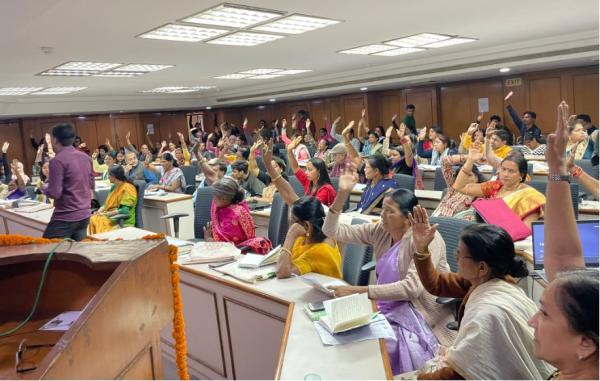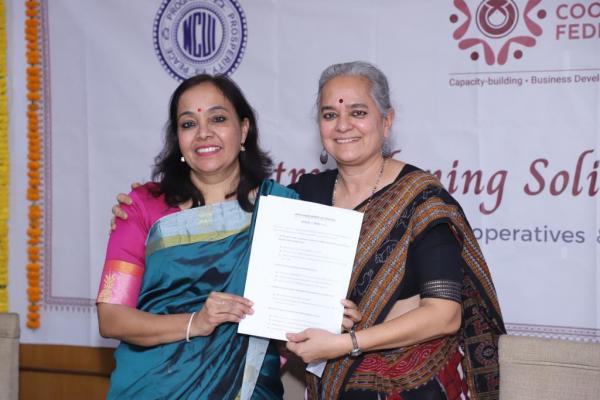
SEWA Cooperative Federation in partnership with ICA-AP, National Cooperative Union of India (NCUI), and SEWA Bharat, organised a national workshop on “Strengthening Solidarity Enabling Women’s Cooperatives and Collective Enterprises to Thrive” on 13 and 14 December. The workshop held at NCUI headquarters was attended by over 100 women cooperators from 18 states in India.
The workshop focused on four themes pertinent for the business of women cooperatives post COVID-19: 1) Ease of doing business – marketing, 2) Access to financial services, 3) Governance and capacity building, and 4) Digital inclusion. The workshop emphasised the importance of women’s cooperatives in building back and restoring livelihoods affected by COVID-19. While there was a digital transformation happening in the world, with structural shifts towards e-commerce platforms and digital payments in India touching the 100 million payments per day, this was not the case for many women’s cooperatives and collective enterprises.

Women cooperators identifies marketing as a key driver for the financial sustainability of thier enterprises and cooperatives. With access to new markets, product diversification, and channel innovation, enterprises increase their customer base and revenue. Women shared experiences of innovative marketing solutions they have undertaken and the challenges they continue to face, in both online and offline marketing. Access to finance is another critical factor for the growth of women's cooperatives. Accessing loans from financial institutions continues to be a challenge because of collateral requirements, high interest rates, and the procedures involved to access finance. In addition, governance of women's cooperatives is key to sustainability in the long term. Informal women workers' enterprises need continuous and appropriate capacity-building support and leadership-building inputs, as well as management training, technical knowledge, and skill upgradation. They also need support for developing their business strategy, for planning, digital literacy, and tailor-made marketing training.
The participating cooperatives exhibited their products in a Women Cooperatives’ Bazaar held at NCUI throughout the two-day workshop. The workshop ended with a set of recommendations, based on the discussions with women at the grassroots. It was presented as ‘Delhi Declaration of Women’s Cooperatives’ to the member of the Committee on Cooperative Policy, Mr. Dileep Sanghani and convenor, Dr. Hema Yadav to be taken forward by them to the Committee Chair, Mr. Suresh Prabhu.

The Declaration focused on the following recommendations:
1. Organise rural and urban women workers, especially those in the informal economy, into cooperatives for livelihood with social protection
- Undertake economic activities that are identified by women including agriculture, animal husbandry, crafts and other production, services, savings and credit, trading and manual labour, among others.
- Link women in cooperatives with government and other programmes and services to strengthen their livelihoods thereby supporting women’s economic empowerment.
- Ensure social protection of women in cooperatives, thereby supporting their economic empowerment by facilitating linkages with government and private social protection and social security providers.
2. Facilitate and provide access to financial services, including working capital and insurance
- Ensure a suitable and affordable stream of finance for women’s cooperatives through public and private sector.
- Insure women cooperators, their businesses, machines and equipment by facilitating linkages with insurance companies.
- Provide financial literacy and financial management training to women cooperators to strengthen and grow their businesses.
3. Provide cooperative education and awareness on the cooperative model as a means of livelihood and social protectio
- Educate women workers on the values and principles of cooperatives.
- Create awareness on the potential of cooperatives and the means by which they can provide livelihoods and social protection for women, build social solidarity and have social and economic impact at local, national and global levels.
4. Provide programmes and courses for capacity-building and strengthening leadership
- Develop appropriate training modules with women cooperators, and as per their needs.
- Develop a cadre of grassroot trainers with experience of working in cooperatives to provide hands-on and appropriate training.
- Provide opportunities for peer learning through exposure programmes, tailor-made courses and mentoring.
- Provide digital literacy training to bridge the gender digital divide and enable online marketing and other business linkages.
5. Advocate for appropriate laws, policies and programmes that promote women’s cooperatives and their collective entrepreneurship
- Create an enabling environment for ease of doing business by simplifying registration procedures, enabling creation and registration of innovative cooperatives, engaged in non-traditional economic activities, simplifying and streamlining compliance and reporting systems through a consultative process with women cooperators.
- Ensure that legislation and regulation of cooperatives and their federations, protect the cooperative’s autonomy and promote independent decision-making.
- Promote and facilitate marketing of products and services of women’s cooperatives, both online and offline, through preferential procurement policies, waiving of deposit monies, capacity-building to navigate the current systems and simplifying these.
- Invest in women’s cooperatives and enable access to financial services at affordable rates, and provide support to actually obtain finance like loans and working capital, and insurance.
- Develop Women’s Enterprise Support Services to provide comprehensive business development services to women’s cooperatives through one window.
- Provide tax moratorium for women’s cooperatives up to Rs 20 Crore turnover.
- Support and enable digitization of women’s cooperatives and organise digital literacy to bridge the gender digital divide.
- Increase representation of women cooperators in cooperative boards, especially in those undertaking economic activities like farming conducted predominantly by women, executive committees of cooperative federations and in national and international cooperative forums.
- Ensure a special role for women cooperators and women’s cooperatives in disaster and emergency situations, by involving them in planning and implementation of all programmes and services for immediate relief and longer-term rehabilitation and resilience-building.
- Encourage research on, by and for women’s cooperatives.
- Link women’s cooperatives pro-actively with all new initiatives like the proposed cooperative university and export of their products and services.
- Link women’s cooperatives and their Federations with the G-20 process, showcase their contributions to the Indian and global economy and facilitate preferential procurement of their cooperatives’ products and services, including export orders.



